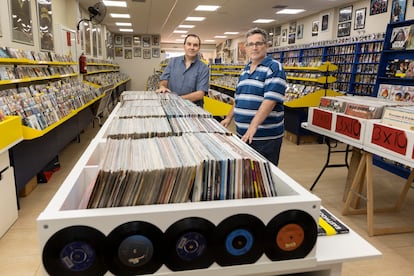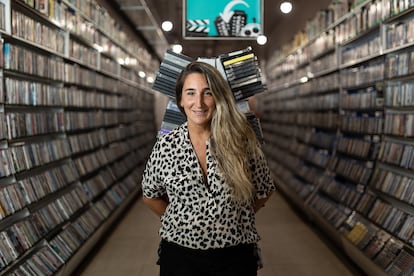Netflix resistance: The video stores fighting the rise of streaming in Spain
These small businesses are continuing to attract customers, who are interested in a wider collection of movies and do not want algorithms deciding what they should watch


“I have streaming platforms for my children, but I don’t watch anything on them because they only offer garbage and I don’t want them to know what I like,” says Julián (not his real name), who is rummaging through a selection of classic films at Regreso al Pasado (Back to the Future), a store that sells DVDs, Blu-Rays, records and collector items in the center of Las Palmas de Gran Canaria, in Spain’s Canary Islands. “Often I see that the family is watching something awful and I turn around, grab my computer and go to see a Cary Grant film.”
Regreso al Pasado, the only store of its kind in the city, is run by Enrique Asunción, Víctor Muñiz and Jorge Sosa. The three have experience in the film and music industry, and one day decided that the boom in digital streaming platforms, such as Netflix and Amazon Prime, was endangering physical formats, which are crucial to collectors, and pushing out less commercial films. It is one of the 300 or so video stores that remain open in Spain, according to figures from the industry.
These 300 stores are part of a small, but global resistance. Only recently, the Wall Street Journal published an article about Free Blockbuster, a movement that began in 2019 that allows residents of Los Angeles to borrow movies on VHS for free. This nostalgia for physical movies, combined with distrust in algorithms, is also present in Spain.

“We want our children to continue our passion for cinema,” says Asunción, from Regreso al Pasado. “Lots of people come here not only to buy [DVDs], but also to talk about film, to buy handbills and posters. And lots of young people come asking for classics or discontinued movies, or to ask for Pink Floyd or ELO records because their parents have introduced them to them. That gives me hope and satisfaction.” Despite the challenges, “the business is going very well,” says the 48-year-old.
“I can’t imagine myself working in anything else,” says Aurora Depares, the owner of Video Instan in Barcelona, which has been open for business since 1977, making it the oldest in the field. Depares has not subscribed to any digital platform, but she has “nothing against them,” she says. “The more culture reaches people, the better,” she explains in a phone conversation. Depares maintains the Video Insta for little more than the pleasure of keeping the family business alive. “I offer 46,000 films and many of them are not on platforms. I think I am doing a job to safeguard these movies and to recommend them. People show me this every day.”
For a flat rate of €8.95, customers at Video Instan can “rent whatever they want,” says Depares. In an effort to boost business, the store also opened a café and a mini cinema in 2018. The plan was to screen a film every day, but then the coronavirus pandemic hit. “I hope that now we are vaccinated and there is more control, my business and those in the neighborhood will bounce back. It’s taking a toll on us,” she says.
Depares’ business is not the only one to feel the impact of the health crisis. “The pandemic has done a lot of damage, even more than piracy,” says Marcia Seburo, the Bolivian owner of Ficciones (Fictions), which rents and sells DVDs in Madrid. “It has been very harmful, not only because of the lockdown itself, but also because of the fact that it pushed people who did not have nor wanted a platform, to subscribe to one,” says Seburo, who herself joined a streaming service during the pandemic.
Concerns over algorithms
For Seburo and many others, the biggest downside of digital platforms is the use of algorithms to decide what content to promote. “You are forced to see what the company wants you to see, you don’t have any autonomy. They start boxing you in, they narrow down your tastes. I have 50,000 titles here [in Ficciones], neither Netflix or HBO together have as many as my catalog,” says Seburo.
Lorena Jaume-Palasi, the managing director of AlgorithmWatch and a member of the Spanish government’s Expert Group on Artificial Intelligence and Big Data, explains by phone that streaming services “use programming techniques based on homophily: it is assumed that people with similar tastes want the same thing.” This presumption has its roots in the 1950s and was developed to study cultural integration in the United States. “These simple and reductionist sociological theories were co-opted by engineers to be applied [to digital platforms], because they are easy to program.” The problem, says Jaume-Palasi, is that they can create a certain uniformity that is “extremely Anglo-American and colonial.”
It’s a concern shared by Julían Barcena, the owner of Videoclub Puente in Reocín in Cantabria. “Every day we are becoming more idle and lazy, and we are limiting ourselves to watching what the big companies impose on us. In the end, we are going to end up like the characters in the film WALL-E,” he says, in reference to the 2018 animated movie, where the remaining human population is hooked up to screens.
Ramón Pagán, the owner of the R. Pagán video rental store in La Unión in Murcia, also says he has noticed the “effect of algorithms and Netflix since the pandemic.” He explains: “The algorithm is a robot interested in favoring platforms, it is going to recommend good and bad horror movies just because you like horror. I can’t do this, because if I give you a bad film I lose credibility and my business is based on the trust [customers] have in me.”
Meanwhile back at Regreso al Pasado, María Victoria, 35, is looking at the films on the shelf for new arrivals. “To see films, I prefer the cinema experience,” she says. “And if not, I come here because there is more on offer, I see people and I can buy things. I’m not interested in platforms, especially since it is very expensive if you want to have a good and wide collection.”
English version by Melissa Kitson.
Tu suscripción se está usando en otro dispositivo
¿Quieres añadir otro usuario a tu suscripción?
Si continúas leyendo en este dispositivo, no se podrá leer en el otro.
FlechaTu suscripción se está usando en otro dispositivo y solo puedes acceder a EL PAÍS desde un dispositivo a la vez.
Si quieres compartir tu cuenta, cambia tu suscripción a la modalidad Premium, así podrás añadir otro usuario. Cada uno accederá con su propia cuenta de email, lo que os permitirá personalizar vuestra experiencia en EL PAÍS.
¿Tienes una suscripción de empresa? Accede aquí para contratar más cuentas.
En el caso de no saber quién está usando tu cuenta, te recomendamos cambiar tu contraseña aquí.
Si decides continuar compartiendo tu cuenta, este mensaje se mostrará en tu dispositivo y en el de la otra persona que está usando tu cuenta de forma indefinida, afectando a tu experiencia de lectura. Puedes consultar aquí los términos y condiciones de la suscripción digital.








































